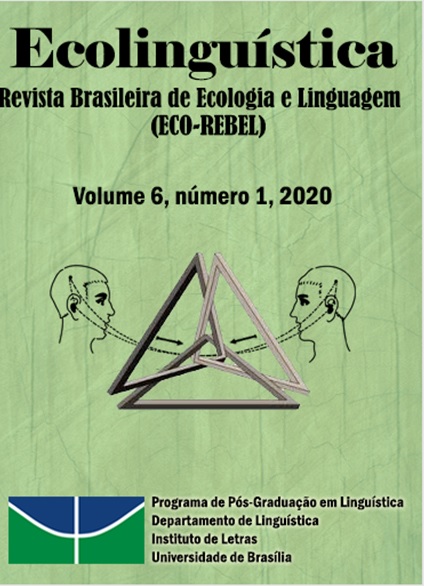Quo vadis ecolinguistics
Resumen
The genre of this paper is aalpiri (Australian Western Desert languages for 'morning growl') and it spells out the reasons why have been less than happy with the way ecolinguistics has developed in recent years. In my opinion, ecolinguistics does not live up to the expectations of its founders and the whole enterprise is far less than the sum of its parts. Much of ecolinguistics is driven by ideology rather than rigid scholarly research and its efficacy leaves much to be desired. The title suggests that ecolinguists have to reflect on where they are going.
Descargas
Citas
Idström, A. & Piirainen, E. (Eds.). (2012). Endangered metaphors. Amsterdam: Benjamins.
Jung, M. (1996). Ökologische Sprachkritik. In: A. Fill (Ed.), Sprachökologie und Ökolinguistik (pp. 149-173). Tübingen: Stauffenburg.
Ketteman, B. & Penz, H. (Eds.). (2000). ECOnstructing Language, Nature and Society. The Ecolinguistic Project Revisited. Essays in Honour of Alwin Fill. Tübingen: Stauffenburg.
Korzybski, A. (1933). Science and Sanity. Lancaster P.A.: The Science Press Printing Company.
Lorenz, K. (1973). Die Rückseite des Spiegels - Versuch einer Naturgeschichte menschlichen Erkennens. München: Piper
Lorenz, K. (1982). Die acht Todsiinden der zivilisierten Menschheit. Miinchen: Piper.
Lovelock, J. (1988) The Ages of Gaia. Oxford: Oxford University Press.
Marko, G. (2000). Go Veggie! A Critical Discourse Analysis ofa Text for Vegetarian Beginners. In B. Ketteman & H. Penz (Eds.), ECOnstructing Language, Nature and Society. The Ecolinguistic Project Revisited. Essays in Honour of Alwin Fill (pp. 217-240). Tübingen: Stauffenburg.
Mühlhäusler, P. (1983). Talking About Environmental Issues. Language and Communication, 3(1), 71-81.
Mühlhäusler, P. (1995). Metaphors others live by. Language and Communication, 15 (3), 281-288.
Mühlhäusler, P. (1996). Linguistic adaptation to changed environmental conditions: Some lessons from the past. In A. Fill (Ed.) Sprachökologie und Ökolinguistik (pp. 105-130). Tiibingen: Stauffenburg.
Mühlhäusler, P. (1997). Language Ecology: Contact Without Conflict. In: Martin Pütz (Ed.) Language Choices: Conditions, Constraints, and Consequences (pp. 3-15). Amsterdam: Benjamins.
Mühlhäusler, P. (2000). Bleached Language on Unbleached Paper: The Language of Ecotourism. In B. Ketteman & H. Penz (Eds.), ECOnstructing Language, Nature and Society. The Ecolinguistic Project Revisited. Essays in Honour of Alwin Fill (pp. 241-253). Tubingen: Stauffenburg Verlag.
Mühlhäusler, P. (2003). Language of Environment: Environment of Language. London: Battlebridge Publications.
Mühlhäusler, P. (2006). Naming languages, drawing language boundaries and maintaining languages, with special reference to the linguistic situation in Papua New Guinea. In: D. Cunningham, D. E. Ingram & K. Sumbuk (Eds.), Language diversity in the Pacific: Endangerment and survival (pp. 24-39). Clevedon: Multilingual Matters.
Mühlhäusler, P. & Peace, A. (2006). Environmental Discourses. Annual Review of Anthropology, 35, 457-479
Mühlhäusler, P. & Damania, R. (2004). Economic costs and benefits of Australian Indigenous languages: Discussion Paper. Canberra: Department of Communication, Information Technology and the Arts (DCITA).
Myerson, G. & Rydin, Y. (1996). The Language of Environment: A new rhetoric. UCL Press: London.
Reddy, M. J. (1979). The conduit metaphor: A case of frame conflict in our language about language. In A. Ortony (Ed.), Metaphor and Thought (pp. 284-310). Cambridge: Cambridge University Press.
Toffler, A. (1970). Future Shock. New York: Random House.
Wohlleben, P. (2016). The hidden life of trees. London: William Collin
Descargas
Publicado
Cómo citar
Número
Sección
Licencia
Autores que publicam nesta revista concordam com os seguintes termos:
Autores mantêm os direitos autorais e concedem à revista o direito de primeira publicação, sendo o trabalho simultaneamente licenciado sob a Creative Commons Attribution License o que permite o compartilhamento do trabalho com reconhecimento da autoria do trabalho e publicação inicial nesta revista.
Autores têm autorização para assumir contratos adicionais separadamente, para distribuição não exclusiva da versão do trabalho publicada nesta revista (ex.: publicar em repositório institucional ou como capítulo de livro), com reconhecimento de autoria e publicação inicial nesta revista.
Autores têm permissão e são estimulados a publicar e distribuir seu trabalho online (ex.: em repositórios institucionais ou na sua página pessoal) a qualquer ponto antes ou durante o processo editorial, já que isso pode gerar alterações produtivas, bem como aumentar o impacto e a citação do trabalho publicado (Veja O Efeito do Acesso Livre).



3.png)



